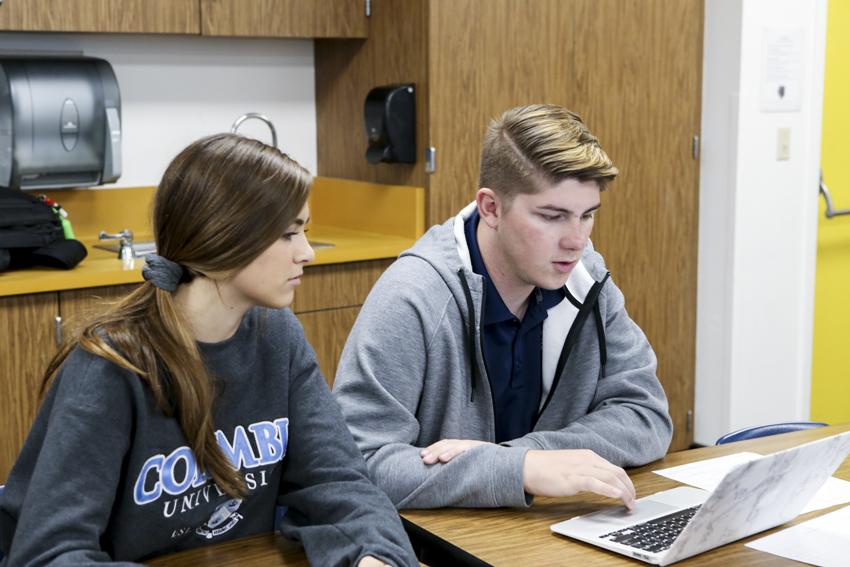Advisors encourage college search sophomore year

School, sports, church, time with friends and a myriad of activities fill the daily lives of high school students. For many sophomores, college either occupies little thought or seems an unaddressable worry. However, tenth-grade students have options to prepare and gain an advantage for college during this second semester.
Although the year 2021 lies a little ways away, second year students possess enough experience in school and out of FCS to explore college options. Michelle Warkentin, Adjunct Transfer/Honors Program counselor at Clovis Community College and past FCS college advisor, encourages students to consider their interests and strengths, and search for college options based on them.
“Tenth grade is a great time for college exploration,” Warkentin said. “With one year of high school under your belt, you have a good understanding of what high school is all about and can better plan for your future. You have been exposed to more advanced subjects to give you an idea of what academic areas are strengths and weakness for you.”
“If nothing else, you can at least make some general decisions such as, ‘I am a math and science whiz…I see NASA in my future’ or ‘I hope to never see another math problem in my life after high school!'” –Michelle Warkentin, Clovis Community College, Adjunct Transfer/Honors Program Counselor
Students typically sign to a college at the end of senior year, not sophomore year. However, tenth graders should consider what type of higher education to pursue. Current FCS academic advisor Evangelina Tello advises sophomores to decide which type of university works for them and visit those schools to gain a better perspective of campus life.
“I highly recommend for sophomores to at least have an idea of what they’re interested in,” Tello said. “Are they planning on going to a two year, are they planning on going to a four year? If they are, is it a private university. Is it a state school, is it a UC? Once they kind of have an idea of the type of universities they’re interested in, go out and visit them.”
Most four-year universities require SAT or ACT scores on their applications. While for some schools, test grades play a minor role in acceptance, high scores can still earn scholarships. Practice for the ACT/SAT, which is open to upperclassmen, should not start with cramming a few weeks or even months before the test. Rather, FC alumnus Matthew Sue, ’18 advises sophomores to seek an understanding of concepts taught now.
“Definitely study for your SATs; that is very important,” Sue said. “The SAT covers a lot of knowledge that you learn in the lower grades, like Math II algebraic concepts. That is very important, that you build that base.”
SAT practice websites, including College Board and Khan Academy, offer personalized preparation based on a student’s strengths and weaknesses. Those who took the PSAT can see which specific skills to improve on for the SAT on College Board’s website. According to an article by CBS News, reading a wide variety of books prepares students for the language portions of the tests.

Rather than waiting until senior year to look for ways to save on college, students can search for scholarships to apply for as a sophomore. One effective scholarship search engine is Fast Web. Fast Web takes one’s interests, grade level, GPA and numerous other factors into account, then compiles a list of reasonable scholarships or grants a student can earn.
High school grades and classes play a large part in college acceptance and scholarships. In addition to seeking experience in the workplace, sophomore Brennen Tozlian is preparing for college by maintaining grades.
“I think about college sometimes when I’m trying to sleep and it’s stressing me out,” Tozlian said. “But I don’t really think about it that much. I’m just making sure my grades are good, and I’m trying to get a job.”
Poor grades hurt a student’s college options, but one thing sophomores should not lose sleep over is deciding once and for all what career to pursue. Warkentin reassures high schoolers to relax and broaden their experiences.
“A common stressor for high school students is that they don’t know what they want to be when they grow up,” Warkentin said. “This is something that many sophomores in college are still struggling with. The best advice I have is don’t stress, explore different options, take interesting elective classes, join clubs and attend summer camps.”
While senior year is still a ways away for sophomores, this second semester holds opportunities. Tenth graders can prepare for the SAT or ACT by studying online or upping their reading level. Earning As, especially in difficult classes, helps expand university options or earn scholarships. Joining clubs, sports, or even pursuing hobbies bolsters portfolios and reveals interests. Finally, checking out what different colleges offer, whether online or in person, will give sophomore students a head start on their college search.
For more article read Feather continues to compete, looks to engage with community events or College Corner: Juniors utilize your Christmas break
Bryce Foshee can be reached via Twitter @brycer_f and via email.





Kyle Clem • Jan 18, 2019 at 12:27 pm
Great article Bryce! That’s really good advice to not worry about not knowing what you want to do.
Hannah • Jan 18, 2019 at 11:25 am
Good job